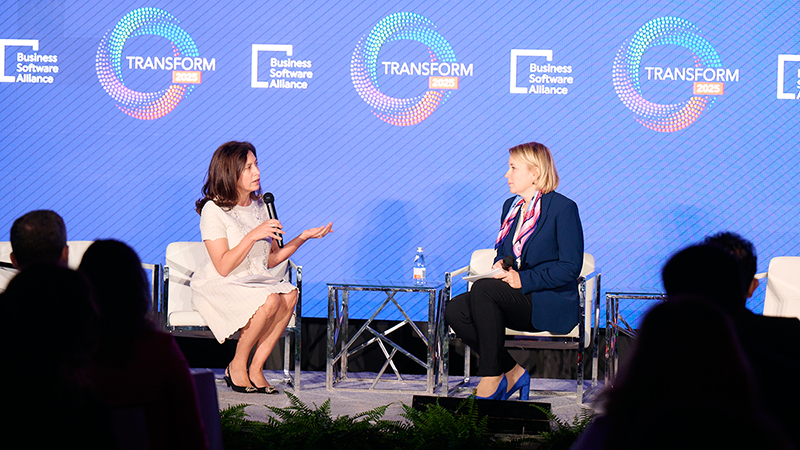Furthering artificial intelligence (AI) adoption and digital diplomacy drew together industry and government leaders at the Business Software Alliance’s (BSA) TRANSFORM forum this week in Washington, DC.
Panels featuring members of the US Congress, past and present administration officials, and leaders from across the enterprise software industry outlined policy solutions to further AI adoption and innovation in the United States and around the world.
AI Adoption & Digital Transformation Across the Economy
BSA CEO Victoria Espinel moderated a discussion on how AI adoption and digital transformation are driving positive economic outcomes across industries, with speakers representing perspectives from the financial services, hospitality, and apparel industries.
Speakers shared real-world examples of how their industries are currently using AI to drive economic impact, with National Restaurant Association CEO Michelle Korsmo highlighting how AI and predictive analytics are helping restaurants better serve customers.
“The single biggest transformation is the level of analytics and predictability that restaurant operators are seeking to get from the AI use cases that they’re putting into place when we break down our technology,” she said.
For the retail industry, American Apparel & Footwear Association CEO Steve Lamar shared an example from a specific member company, noting that AI helped to “reduce design time by 50 percent, so that designers spend more time designing, rather than redoing.”
Financial Services Forum CEO Amanda Eversole noted the value of testing environments for AI in the banking industry.
“We need to have sandboxes. We have the places where we can experiment, and yet there are some safety and protections around that,” she said.
Espinel applauded these practical uses of AI in industry, emphasizing that “BSA feels strongly that the countries whose companies are using AI effectively are going to see the greatest economic benefits,” and pointing to BSA’s work on AI adoption around the world.

Digital Diplomacy in Focus: Fostering Trans-Atlantic Cooperation & Innovation
Next, Espinel spoke with Ambassador Jovita Neliupšienė about opportunities for further digital collaboration between two leading economies: the European Union and the United States.
As Head of the Delegation of the European Union to the United States, Neliupšienė speaks from experience about the importance of close collaboration between the EU and the US when setting AI policy and promoting AI adoption.
“Working alone will not give us the results we want,” she said.

Data Across Borders Driving Economic Growth
BSA Senior Vice President of Global Policy Aaron Cooper moderated the next panel, which focused on how cross-border data transfers affect global economic growth.
During the discussion, Elastic Chief Legal Officer and BSA Board Member Carolyn Herzog highlighted how broad access to data helps improve software-enabled services.
“If we have legal uncertainty and are not clear about how we’re supposed to go about transferring and managing data, and how we can help people use that data, that creates a huge challenge,” she said.
Bill Guidera, Deputy Assistant Secretary for Services at the US Department of Commerce’s International Trade Administration, announced that his office is currently accepting comments on the American AI Exports Program, and urged attendees to highlight barriers to global AI adoption.
“My guidance to those of you who are considering a response is this: Bring it,” he said. “Tell us what you need. Tell us where your friction points are with the government. Tell us if you’re working with the government today and you think those resources can be better deployed or enhanced. Tell us what you think.”
Digital Diplomacy in Focus: UK-US Technology Prosperity Deal
Espinel also spoke with James Roscoe about the UK-US Technology Prosperity Deal and future cooperation between the two countries.
As Acting Ambassador of the United Kingdom to the United States, Roscoe helped illuminate some of the UK’s motivations behind the Tech Prosperity Deal.
“We’re talking about governments being sort of nervous about what they don’t understand,” he said. “I think that our government feels much more confident about this, and we can see that when it comes to AI, when it comes to quantum, we want to be regulating for growth, not regulating for risk.”
AI Unlocking Potential for the American Worker
Brie Sachse, Siemens USA Senior Vice President & Head of Government Affairs, led the next panel that featured industry and government perspectives on how AI can transform the workforce.
A key focus of the conversation was related to upskilling the workforce in the wake of AI, with several important points surfaced by panelists.
Sachse started with the big picture, suggesting that we “look at how technology can bring those at our sideline back to work.” The Center for Democracy & Technology President & CEO Alex Reeve Givens further emphasized the need to incorporate workers’ voices into AI policy development.
Nicole Isaac, Vice President for Global Public Policy & Government Affairs at Cisco, pointed to closing the connectivity gap as key to bridging the workforce skills challenge.
“With respect to challenges, the biggest one is connectivity. There are 2.7 billion individuals around the world who are disconnected from access to Internet services and access to critical AI technologies that can transform their lives,” she said. “So, when you think about the ways in which we can actually resolve those challenges, first and foremost, identify ways in which we can connect individuals to that requisite hardware and software.”
Rep. Suhas Subramanyam (D-VA) highlighted the benefits of using AI as a tool to aid the actual AI skills development process, noting that “AI has an incredible ability to help us upskill the workforce itself.”
From Blueprint to Impact: Reflections on the US AI Action Plan and the Road Ahead
BSA Senior Vice President of US Government Relations Craig Albright spoke with Dean Ball, Senior Fellow at the Foundation for American Innovation, on the US AI Action Plan and how the US can implement it in the future.
Ball described how AI adoption was a core consideration in driving the AI Action Plan.
“I don’t think we should set our hair on fire,” he said. “I don’t think we should panic or despair. I think we should sit down and write policy that actually solves the problems incrementally step by step, and it seems eminently possible to do.”

What’s Next for Enterprise AI?
Cooper returned to the stage to moderate a panel about the future of enterprise AI, which featured perspectives from insiders at EY, Docusign, and the US Congress.
The panel featured the co-chairs of the House AI Task Force — Reps. Ted Lieu (D-CA) and Jay Obernolte (R-CA) — who spoke about opportunities for US leadership in enterprise AI. (Obernolte and Lieu were also recognized as BSA Digital Diplomacy Champions.)
Lieu, who is Vice Chair of the House Democratic Caucus, pointed to the many advantages the US has in this space.
“We have the talent, we have the venture capital, we have the resources … to allow people to execute their ideas and help society. And I believe America will continue to be ahead of our competitors,” he said.
Obernolte, who is Vice Chair of the Congressional AI Caucus, pointed to the many advantages the US has in this space.
“The international community is hungry for US leadership in this space,” he said, “and we’ve kind of left a vacuum in this way. We can establish US leadership and try things like standard settings and international cooperation for the non-proliferation of malicious AI, for example, and really bring the worldwide community together in a way that enhances safety, while also easing the path for the deployment of AI and all of the gains in efficiency and productivity.”
Through EY’s work consulting companies on AI adoption, Dan Diasio, EY Global AI Leader, was able to offer helpful insights into how companies in general are approaching AI adoption.
“Most companies,” he said, “are now on this journey to build a training program on what to use, what not to use, whether or not you can upload data to this particular model or that particular model, and starting to build a governance process.”
Docusign Chief Information Security Officer Michael Adams addressed a specific challenge enterprises are facing with AI: incongruent state laws.
“For us,” he said, “a disparate patchwork is problematic. And it’s not just problematic for the two innovators in the moment. It’s when we innovate routinely. We are aggressively innovative in the right types of environments, sandboxes, and so forth.”

Digital Diplomacy Champions Recognized
The TRANSFORM program concluded by recognizing BSA’s four US-based Digital Diplomacy Champions: Obernolte, Lieu, and Reps. Suzan DelBene (D-WA) and Darin LaHood (R-IL), who lead the House Digital Trade Caucus.
These honorees join a roster of distinguished leaders from the EU, UK, Japan, and Singapore, whom BSA selected for their work to advance responsible tech policy around the world.
Keep an eye out for more recap content from BSA in the weeks ahead.

